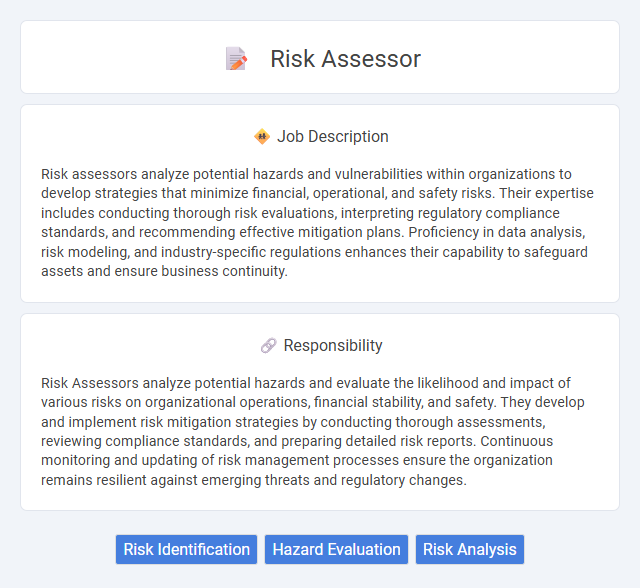
Risk assessors analyze potential hazards and vulnerabilities within organizations to develop strategies that minimize financial, operational, and safety risks. Their expertise includes conducting thorough risk evaluations, interpreting regulatory compliance standards, and recommending effective mitigation plans. Proficiency in data analysis, risk modeling, and industry-specific regulations enhances their capability to safeguard assets and ensure business continuity.
Individuals with strong analytical skills and attention to detail are likely to be well-suited for a Risk Assessor role, as the job requires evaluating potential hazards and assessing their impact. Those who thrive in environments demanding critical thinking and decision-making under uncertain conditions might find this career fulfilling. However, people who prefer routine tasks or avoid making complex judgments may find the role challenging and less compatible with their strengths.
Qualification
Risk Assessors typically require a bachelor's degree in risk management, finance, or a related field, with certifications such as Certified Risk Manager (CRM) or Professional Risk Manager (PRM) enhancing job prospects. Proficiency in data analysis tools, strong understanding of regulatory compliance, and experience with risk assessment methodologies are essential qualifications. Advanced skills in statistical software, critical thinking, and effective communication further improve a candidate's ability to identify, evaluate, and mitigate potential risks in various industries.
Responsibility
Risk Assessors analyze potential hazards and evaluate the likelihood and impact of various risks on organizational operations, financial stability, and safety. They develop and implement risk mitigation strategies by conducting thorough assessments, reviewing compliance standards, and preparing detailed risk reports. Continuous monitoring and updating of risk management processes ensure the organization remains resilient against emerging threats and regulatory changes.
Benefit
Risk Assessors likely enhance organizational safety by identifying potential hazards and recommending preventative measures. Their expertise may reduce financial losses and improve regulatory compliance. Employing a Risk Assessor could increase overall operational efficiency and protect company assets.
Challenge
Risk assessors likely encounter complex challenges in identifying and evaluating potential hazards across diverse industries. The intricate nature of predicting risks may require continuous adaptation to evolving regulations and emerging threats. Success in this role probably depends on analytical skills and proactive problem-solving to mitigate uncertainties effectively.
Career Advancement
Risk Assessors gain career advancement by developing expertise in identifying, analyzing, and mitigating financial, operational, and compliance risks within industries such as finance, insurance, and construction. Progression often leads to senior roles such as Risk Manager, Compliance Officer, or Chief Risk Officer, where strategic decision-making and leadership skills become pivotal. Advanced certifications like FRM (Financial Risk Manager) or CRM (Certified Risk Manager) significantly enhance job prospects and salary potential.
Key Terms
Risk Identification
Risk Assessors play a crucial role in Risk Identification by systematically analyzing organizational processes to detect potential hazards and vulnerabilities that could impact safety, compliance, or operational effectiveness. They employ various methodologies such as qualitative and quantitative risk analysis, site inspections, and data review to uncover hidden or emerging risks. Accurate Risk Identification supports proactive mitigation strategies that minimize financial losses and enhance overall organizational resilience.
Hazard Evaluation
Risk assessors specialize in hazard evaluation, identifying potential threats to workplace safety and health by analyzing environmental factors, equipment, and processes. They utilize quantitative and qualitative methods to evaluate the severity and likelihood of hazards, supporting the development of effective control measures. Expertise in regulatory standards such as OSHA and ISO 45001 ensures compliance and proactive risk mitigation strategies.
Risk Analysis
Risk assessors specialize in identifying potential hazards and evaluating the likelihood and impact of risks within various industries, enabling organizations to implement effective mitigation strategies. Proficient in quantitative and qualitative risk analysis techniques, they analyze data from historical records, environmental conditions, and operational processes to forecast potential threats. Their expertise ensures compliance with regulatory standards while enhancing safety protocols and minimizing financial losses.
 kuljobs.com
kuljobs.com